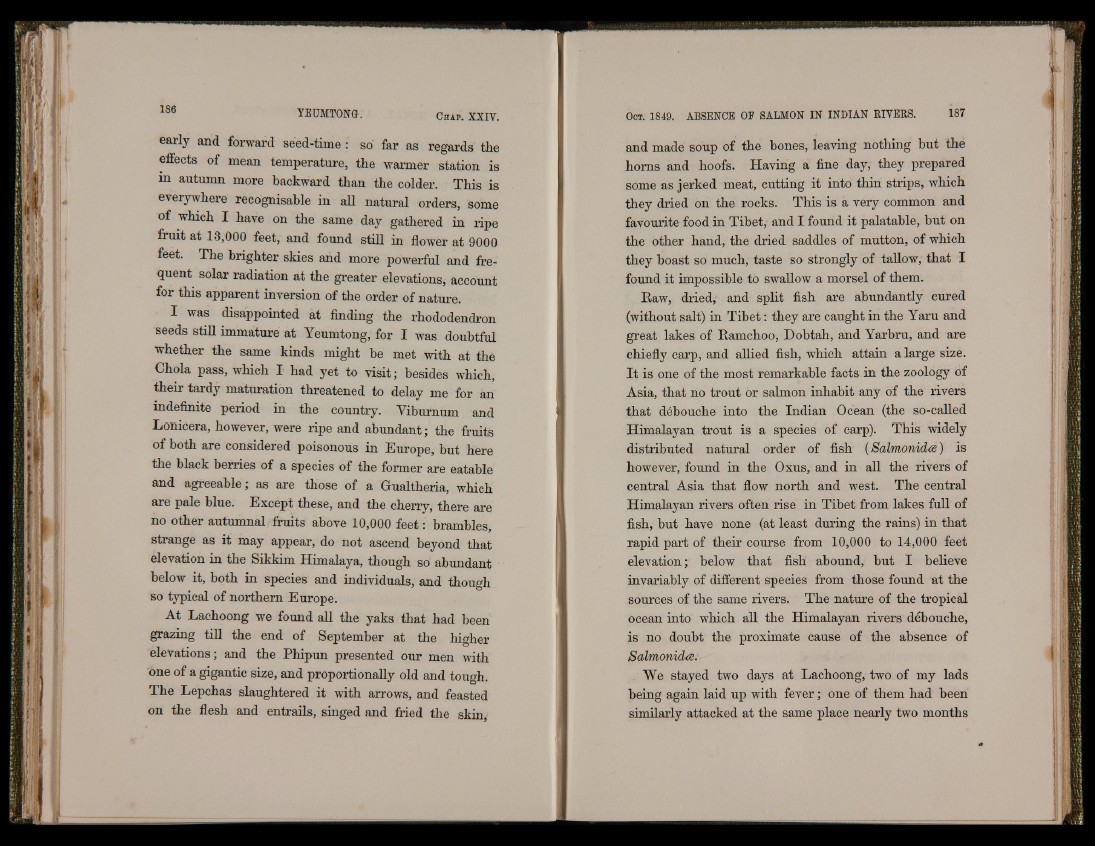
early and forward seed-time : so far as regards the
effects of mean temperature, the warmer station is
in autumn more backward than the colder. This is
everywhere recognisable in all natural orders, some
of which I have on the same day gathered in ripe
fruit at 13,000 feet, and found still in flower at 9000
feet. The brighter skies and more powerful and frequent
solar radiation at the greater elevations, account
for this apparent inversion of the order of nature.
I was disappointed at finding the rhododendron
seeds still immature at Yeumtong, for I was doubtful
whether the same kinds might be met with at the
Chola pass, which I had yet to visit; besides which,
their tardy maturation threatened to delay me for an
indefinite period in the country. Viburnum and
Lonicera, however, were ripe and abundant; the fruits
of both are considered poisonous in Europe, but here
the black berries of a species of the former are eatable
and agreeable; as are those of a Gualtheria, which
are pale blue. Except these, and the cherry, there are
no other autumnal fruits above 10,000 fe e t: brambles,
strange as it may appear, do not ascend beyond that
elevation in the Sikkim Himalaya, though so abundant
below it, both in species and individuals, and though
so typical of northern Europe.
At Lachoong we found all the yaks that had been
grazing till the end of September at the higher
elevations; and the Phipun presented our men with
one of a gigantic size, and proportionally old and tough.
The Lepchas slaughtered it with arrows, and feasted
on the flesh and entrails, singed and fried the skin,
and made soup of the bones, leaving nothing but the
horns and hoofs. Having a fine day, they prepared
some as jerked meat, cutting it into thin strips, which
they dried on the rocks. This is a very common and
favourite food in Tibet, and I found it palatable, but on
the other hand, the dried saddles of mutton, of which
they boast so much, taste so strongly of tallow, that I
found it impossible to swallow a morsel of them.
Raw, dried, and split fish are abundantly cured
(without salt) in Tibet : they are caught in the Yaru and
great lakes of Ramchoo, Dobtah, and Yarbru, and are
chiefly carp, and allied fish, which attain a large size.
I t is one of the most remarkable facts in the zoology of
Asia, that no trout or salmon inhabit any of the rivers
that débouche into the Indian Ocean (the so-called
Himalayan trout is a species of carp). This widely
distributed natural order of fish ( Salmonidce ) is
however, found in the Oxus, and in all the rivers of
central Asia that flow north and west. The central
Himalayan rivers often rise in Tibet from lakes full of
fish, but have none (at least during the rains) in that
rapid part of their course from 10,000 to 14,000 feet
elevation ; below that fish abound, but I believe
invariably of different species from those found at the
sources of the same rivers. The nature of the tropical
ocean into which all the Himalayan rivers débouche,
is no doubt the proximate cause of the absence of
Salmonidce.
We stayed two days at Lachoong, two of my lads
being again laid up with fever ; one of them had been
similarly attacked at the same place nearly two months